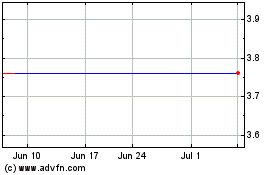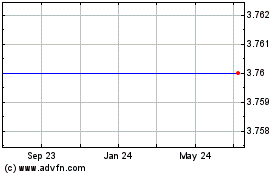Chiasma to Present on New Methodologies in Acromegaly Clinical Trial Design at 12th Acromegaly Consensus Conference
June 18 2018 - 4:05PM

Chiasma, Inc. (Nasdaq:CHMA), a clinical-stage biopharmaceutical
company focused on improving the lives of patients with rare and
serious chronic diseases, today announced that Drs. William Ludlam
and Asi Haviv will present at the 12th Acromegaly Consensus
Conference on June 19th in Prague. The presentation is titled “New
Methodologies in Acromegaly Clinical Trial Design – Octreotide
Capsules, a Case Study.”
Pharmacologic treatment of acromegaly includes chronic therapy
with parenteral Somatostatin Receptor Ligands (SRLs), including
octreotide. Chiasma is evaluating an oral formulation of
octreotide, conditionally trade-named MYCAPSSA® and designed for
delivery of octreotide in twice-daily oral capsules, in two Phase 3
clinical trials.
“The Acromegaly Consensus Conference is a unique forum where
dozens of opinion leaders will embark in an evidence-based process
to generate updated consensus guidelines. Participants will include
neurosurgeons and endocrinologists with extensive experience in
treating acromegaly. Chiasma has been invited to inform the
acromegaly community about our body of work to potentially improve
the lives of patients who face challenges associated with their
existing treatments for acromegaly,” said Dr. Ludlam, senior vice
president, clinical development and medical affairs for Chiasma.
“Our octreotide capsules product candidate is designed for the
maintenance therapy of adult patients with acromegaly. If approved,
MYCAPSSA would be the first oral somatostatin analog in an
injectable-only acromegaly treatment market.”
The clinical program to date includes nine Phase I studies in
healthy volunteers assessing PK, PD, food effects and drug-drug
interactions, two studies in hepatically and renally impaired
patients, a completed Phase 3 study (CH-ACM-01), and two ongoing
Phase 3 studies (MPOWERED and CHIASMA OPTIMAL) in acromegaly
patients who previously demonstrated biochemical control on
injectable SRL treatment. In addition, the clinical development
program includes an observational study to assess treatment
satisfaction with injectable SRLs and a validation study for a new
patient reported outcome (PRO) tool, the Acromegaly Treatment
Satisfaction Questionnaire (Acro-TSQ).
The Acromegaly Consensus Conference is a closed, invitation-only
workshop where key opinion leaders advise on evidence-based
treatment guidelines for acromegaly patients.
About Acromegaly
Acromegaly typically develops when a benign tumor of the
pituitary gland produces too much growth hormone (GH), ultimately
leading to significant health problems and early death if
untreated. There are an estimated 69,000 individuals with
acromegaly worldwide. In 13 studies of acromegaly prevalence since
1980, an average of approximately 75 cases per million was
determined, suggesting roughly 24,000 individuals with acromegaly
in the United States, of which an estimated 8,000 are treated
chronically with somatostatin analog injections. However, previous
data suggest that pituitary tumors may be more prevalent than
previously thought, and that the global prevalence of acromegaly
may be higher, between 85 and 118 cases per million people.
National Institutes of Health (NIH) also cites an annual incidence
of three to four new cases per million each year. Because symptoms
often develop slowly, diagnosis may be delayed by years or decades,
making it difficult to determine the total number of people with
the disease.
Common features of acromegaly are facial changes, intense
headaches, joint pain, impaired vision and enlargement of the
hands, feet, tongue and internal organs. Serious health conditions
associated with the progression of acromegaly include type 2
diabetes, hypertension, respiratory disorders and cardiac and
cerebrovascular disease.
Current treatment options include surgery to remove the
pituitary tumor, radiation therapy, which destroys any lingering
tumor cells, and/or medical treatment in cases where these
approaches are not possible or fully effective. Today's medical
treatments include dopamine agonists, GH antagonists, and
injectable somatostatin analogs, which are the current standard of
care.
About Chiasma
Chiasma is focused on improving the lives of patients who face
challenges associated with their existing treatments for rare and
serious chronic diseases. Employing its Transient Permeability
Enhancer (TPE®) technology platform, Chiasma seeks to develop oral
medications that are currently available only as injections. The
Company recently initiated CHIASMA OPTIMAL, its third Phase 3
clinical trial for its octreotide capsules product candidate,
conditionally trade-named MYCAPSSA®, for the maintenance therapy of
adult patients with acromegaly in whom prior treatment with
somatostatin analogs has been shown to be effective and tolerated
following agreement with the FDA on the design of the trial.
Chiasma is headquartered in Waltham, MA with a wholly owned
subsidiary in Israel. MYCAPSSA, TPE, CHIASMA and the CHIASMA logo
are registered trademarks of Chiasma. For more information, please
visit the Company’s website at www.chiasma.com.
Contact: Andrew BlazierSharon Merrill
Associates(617) 542-5300chma@investorrelations.com
Chiasma (NASDAQ:CHMA)
Historical Stock Chart
From Mar 2024 to Apr 2024

Chiasma (NASDAQ:CHMA)
Historical Stock Chart
From Apr 2023 to Apr 2024
